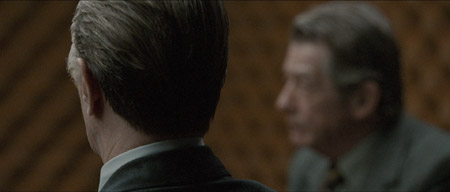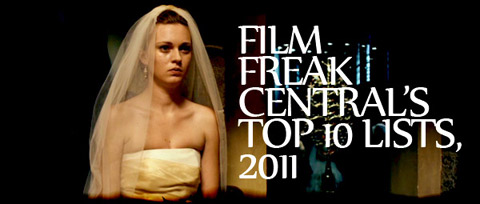 ****/**** Image A Sound A Extras B
****/**** Image A Sound A Extras B
starring Gary Oldman, Colin Firth, Tom Hardy, John Hurt
screenplay by Bridget O’Connor & Peter Straughan, based on the novel by John le Carré
directed by Tomas Alfredson
 by Walter Chaw The easy thing is to say that Tomas Alfredson has followed up his tremendous vampire flick Let the Right One In with another vampire flick, a story of Cold War British Intelligence as men in shadows, exhausted, living off the vibrancy of others. Yet Tinker Tailor Soldier Spy, the Swedish director’s adaptation of John le Carré’s seminal spy novel, is something a good deal more than a clever segue from one genre film to another. Less a companion piece to the latest Mission: Impossible than a bookend to Lars von Trier’s end-of-the-world Melancholia, it’s a character study, sure, but more accurately it’s an examination of a culture of gestures and intimations, where a flutter of an eyelid causes a hurricane in another part of a corrupt, insular world. Naturally, its timeliness has nothing to do with its literal milieu (all Russian bogeys and ’70s stylings)–nothing to do with recent world events that have an entire CIA cell blown up in Iran and Lebanon–and everything to do with its overpowering atmosphere of feckless power and utter resignation. It’s a spy thriller that Alfred Lord Tennyson would’ve written–the very filmic representation of acedia.
by Walter Chaw The easy thing is to say that Tomas Alfredson has followed up his tremendous vampire flick Let the Right One In with another vampire flick, a story of Cold War British Intelligence as men in shadows, exhausted, living off the vibrancy of others. Yet Tinker Tailor Soldier Spy, the Swedish director’s adaptation of John le Carré’s seminal spy novel, is something a good deal more than a clever segue from one genre film to another. Less a companion piece to the latest Mission: Impossible than a bookend to Lars von Trier’s end-of-the-world Melancholia, it’s a character study, sure, but more accurately it’s an examination of a culture of gestures and intimations, where a flutter of an eyelid causes a hurricane in another part of a corrupt, insular world. Naturally, its timeliness has nothing to do with its literal milieu (all Russian bogeys and ’70s stylings)–nothing to do with recent world events that have an entire CIA cell blown up in Iran and Lebanon–and everything to do with its overpowering atmosphere of feckless power and utter resignation. It’s a spy thriller that Alfred Lord Tennyson would’ve written–the very filmic representation of acedia.
Control (John Hurt) and his No. 1, George Smiley (Gary Oldman), are relieved of their duties as ringmasters of the “Circus” after a mission into Czechoslovakia (may as well be Transylvania, no?) results in the injury, torture, and covert repatriation of agent Prideaux (Mark Strong). Disgraced and soon dead, Control is convinced that Prideaux was betrayed by a mole at the highest level of British Intelligence, a “Gerald” whom agent Ricki Tarr (Tom Hardy) had uncovered while engaged in a tryst with the ridiculously beautiful Irina (Svetlana Khodchenkova), a Russian intelligence officer’s wife he’s now obsessed with smuggling out of Russia. Tarr alerts his boss, Peter Guillam (Benedict Cumberbatch), who alerts his boss, Oliver Lacon (Simon McBurney), who resurrects Smiley to ferret out this Gerald, hopefully without the new inner circle of Percy Alleline (Toby Jones), Bill Haydon (Colin Firth), Roy Bland (Ciaran Hinds), and Toby Esterhase (David Dencik) getting wise to the investigation. Smiley’s attempts to keep Intelligence in the dark constitute the first of progressively larger ironies, culminating in the mole’s confession as something along the lines of choosing the side he chose based on aesthetics.
Alfredson plays with the idea of beauty and its loss in the character of disgraced analyst Connie (Kathy Burke) and Connie’s scene in the modest bedroom of her ignoble retirement. “I don’t know about you, but I feel seriously under-fucked,” she says, inviting Smiley to sit down beside her on a double bed as she goes through a shoebox full of photographs. (She asks that George never return, because she’d prefer not to remember these heroes of England the way they’d become in the years since the War.) He plays with it again in the mere fact that Connie here is the British bird and Irina is the Russian. The pain in Tinker Tailor Soldier Spy, though, is ultimately the understanding that no matter the valour and righteousness, in the end it’s worms and suppuration unto mud and ash. London Bridge is falling down, to quote not only the same genus of children’s rhyme as the eponymous codenames for the objects of Control’s paranoia, but also T.S. Eliot’s use of the same to speak of the end of distinct human culture. There’s no appreciable difference between the good guys and the bad guys. Even the holy grail of American intervention is corrupted in the film by the casual reference to the CIA’s systemic tactics of torture and assassination. Yes, you shudder when Prideaux is beaten and forced to witness the most brutal thing I’ve seen in film this year, despite the relative reserve of its presentation–but what to make of its juxtaposition against the detailed description of the good guys at play?
Tinker Tailor Soldier Spy is a masterpiece. It carves out a place alongside the classic BBC adaptation starring Alec Guiness with a performance by Oldman that avoids comparison to Guiness’s inimitable twinkle in being its own duller, animal thing. The first time we really meet Smiley, he’s sitting by himself, carefully composed, watching television. He hardly has nerves; he barely reacts. The lingering impression of him until the end is one of an old 35mm camera, blocky and immobile and squatting off to the side as everything unfolds in front of him. When he uncoils for the denouement, in an extremely fine montage that tidies things up neater than the BBC version (neater, too, than le Carré’s source novel, but to marvellous effect), it’s frankly terrifying. Oldman has never played the predator more effectively, not even in Coppola’s Dracula; he is completely the insect until the final shot of the film, when he pays his only nod to Guiness’s Smiley. He allows us, for just a moment, to see how alien is his intelligence and exactly how incomprehensible is the criteria by which he measures victory. And the film is as carefully modulated and exacting as its central performance. If there’s a hallmark for emerging force Alfredson, it’s his absolute patience…and his absolute nihilism. Like its central visual metaphor, the picture is a chess game without a board: Pieces are lost, position is won, and there is no definition for success. I didn’t think I’d like Tinker Tailor Soldier Spy going in, so obvious was its pedigree and its timing. But it’s one of the best films of the year. Originally published: December 9, 2011.
THE BLU-RAY DISC
by Bill Chambers Through Universal, Focus Features brings Tinker Tailor Soldier Spy to Blu-ray under their new “Four-Star Collection” banner. (Too bad that honour doesn’t correspond to less generic cover art.) The 2.35:1, 1080p transfer is both filmic and filmy, boasting of rich, fine grain and a cigarette haze that’s almost tactile. Though the movie made my Top 10 of 2011, I didn’t see it in theatres, and that cinematic glaze got mostly compressed out of the image on the for-your-consideration DVD–to the point where I didn’t realize I was looking at something shot in 35mm. (Super35, to be precise.) Here, its celluloid origins are gloriously palpable. Blacks range from sooty to silky without banding or blotting, and detail is organically sharp. The soundmix feels a bit more modern than the cinematography, with a wiretapping making gimmicky use of the discrete surrounds, the various gunshots packing a wallop, and Alberto Iglesias’s conspiracy-jazz score enveloping the viewer. It’s all lushly delivered in a 5.1 DTS-HD MA track that’s been mastered at a fuller volume than I anticipated, based on the hushed tenor of the piece. Also on board is a feature-length yakker from director Tomas Alfredson and star Gary Oldman–Alfredson on the right channel and Oldman on the left. Unfortunately, despite their mutual admiration and good humour, the conversation is so spotty and sedate that it really could’ve used a moderator. A few of Alfredson’s comments resonate nonetheless, in the case of his observation that Control signs his name in green ink per John le Carré’s description because it’s an homage frankly diluted/defeated by the film’s anaemic colour palette.
Individual interviews with actors Oldman, Tom Hardy, and Colin Firth, Alfredson (joined by co-screenwriter Peter Straughan), and le Carré kick off the video-based extras. Running 57 minutes in toto, these were all recorded, with the exception of le Carré’s, on the junket circuit, and as a by-product some keen insights are reduced to soundbites. I like Oldman describing the Alec Guiness Smiley as “cuddlier” and Hardy blaming the need to reshoot his character’s scenes on a bad wig, a bad accent, and being debilitatingly starstruck by Oldman. Firth is Firth, while the PR environment unfortunately does not lend itself to fleshing out the subtext of the Alfredson/Straughan clips, which is that Straughan’s wife and co-author Bridget O’Connor succumbed to cancer while the film was in production.
Receiving the longest segment, le Carré–called by his real name, David, by the unseen, unnamed interrogator– recaps the genesis of his source novel, the fifth book for Smiley but the first in the so-called “Karla Trilogy.” Along the way, he paints a predictably evocative portrait of the spy game in decline, populated by names that will ring bells among espionage buffs, names like Kim Philby and George Blake. A batch of four deleted scenes (7 mins. in total, HD) seem to include the one that Alfredson elsewhere names as his favourite, wherein an “old queer” sidles up to Smiley at the lake. Equally memorable is a mesmerizing four-minute take in which Smiley methodically prepares and devours a fried egg. What a crazy trailer it would’ve made! Rounding out the supplements is “Tinker Tailor Soldier Spy: First Look” (13 mins., HD), an infomercial for the thing you’ve just bought, watched, or rented, though some may appreciate its CliffsNotes-ification of the movie’s complex plot. Forced, dynamically-driven HD trailers load up on startup of the disc, which of course comes with the requisite DVD-slash-Digital Copy.
128 minutes; R; 2.35:1 (1080p/VC-1); English 5.1 DTS-HD MA, English DVS 2.0, French DTS 5.1, Spanish DTS 5.1; English SDH, French, Spanish subtitles; BD-50 + DVD-9; Region A; Universal

![Tinker, Tailor, Soldier, Spy [Blu-ray]](https://m.media-amazon.com/images/I/51i9heUKfJL._SL500_.jpg)


